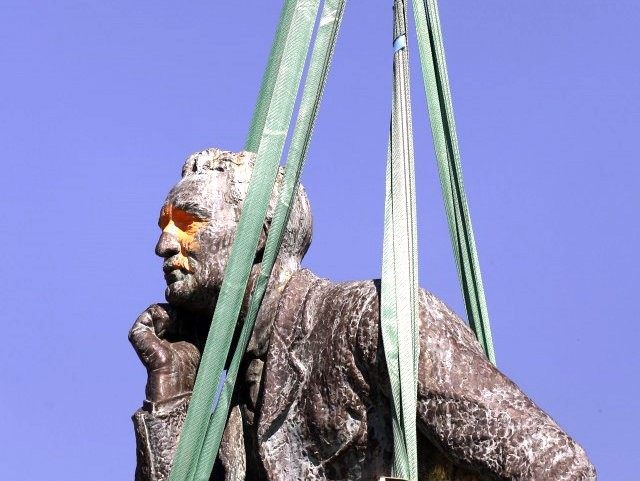A statue of Cecil Rhodes at the University of Cape Town has been removed after students launched an uncompromising campaign to have the great man expunged from history.
The statue of the British businessman, mining magnate, philanthropist and politician has stood in the grounds of the university since the 1920s. Rhodes donated the land on which the institution is built and provided much of its initial wealth.
Protesters threw red paint on the bronze and danced on the plinth as the statue was lifted off on Friday. “It was a symbol of institutionalized racism,” said Ramahiba Mahapha, the leader of students’ representative council.
Students began a hashtag campaign (#Rhodesmustfall) earlier in the year and have repeatedly vandalized the monument with spray paint and buckets of human excrement, forcing the university management to board it up in March.
Since the statue was taken away, the hashtag #Rhodeshasfallen has started trending in its place. Here are a few examples.
Now that #RhodesHasFallen. How about we just stop erecting statues altogether? Plant trees instead? Signifies future, growth & humility.
— Simon de la Rouviere (@simondlr) April 10, 2015
Just going to leave this here… #RhodesHasFallen pic.twitter.com/Djg7s1kocH
— Kaveshan Chetty (@KaveshanChetty) April 10, 2015
The spirit of Robert Mugabe is here, Rhodes had to fall. What a coincidence! #RhodesHasFallen
— Seabelo (@SeabeloSeleke) April 8, 2015
The new world will be created by, and belong to, those brave enough to make it happen. #RhodesHasFallen pic.twitter.com/fmGqWf4Fzm
— ★Charlie★Mathews★ (@mandyldewaal) April 9, 2015
Similar protests have spread across South Africa with wide-spread demands for the removal of other statues of prominent figures of the nation’s past, including Louis Botha and Paul Kruger.
Not everyone agrees, however.
The civil rights group Afriforum said that Afrikans are “increasingly being portrayed as criminals,” and “all cultures and heritage should be respected by everyone. The Afrikaner also wants our heritage to be preserved for future generations, so that they can also learn from the past.”
The Democratic Alliance opposition party said, “The defacement of statues is a total distraction from the heart of the issue.” Mmusi Maimane, the party’s parliamentary leader, added; “Poverty and inequality remain with us 21 years after apartheid because of the ANC’s failure to transform South Africa. That is the real scandal in our country.”
In “solidarity” with the #Rohdesmustfall campaign in South Africa, supporters of the despotic Robert Mugabe in Zimbabwe have threatened to dig up and destroy Rhodes’ grave in the Matobo Hills (which still attracts thousands of visitors each year, bringing much-needed tourism revenue to the area.)
All of which seeks to denigrate the achievements of a man who always put Africa – and its people – first.
He moved to the continent at 17 to stay with his brother. Initially Rhodes worked in agriculture, before going on to found the De Beers diamond firm which he built up to be a world leader that until recently controlled much of the global trade. His business employed thousands and made him one of the wealthiest men in the world.
“Remember that you are an Englishman, and have consequently won first prize in the lottery of life,” said Rhodes, the son of a vicar from Hertfordshire.
Like many giants of history, Rhodes is a controversial figure. He was also a man of his time, and lectures at the university have attempted to reminded students that it is problematic to judge historical figures by the moral standards of today.
Rhodes is credited with bringing rapid development and wealth to large parts of Africa. He set up the world’s most famous educational grant, the Rhodes Trust, which bequeaths benefits on thousands of students and scholars of all nationalities and races to this day. The Rhodes University in Grahamstown, Eastern Cape, was funded by him.
Rhodes is most famous for his grandiose dream of drawing a “red line” from Cairo to Cape Town, the length of the continent, without leaving British territory and constructing a railroad to prove it. Rhodesia – now Zambia and Zimbabwe – was also named after him.

COMMENTS
Please let us know if you're having issues with commenting.